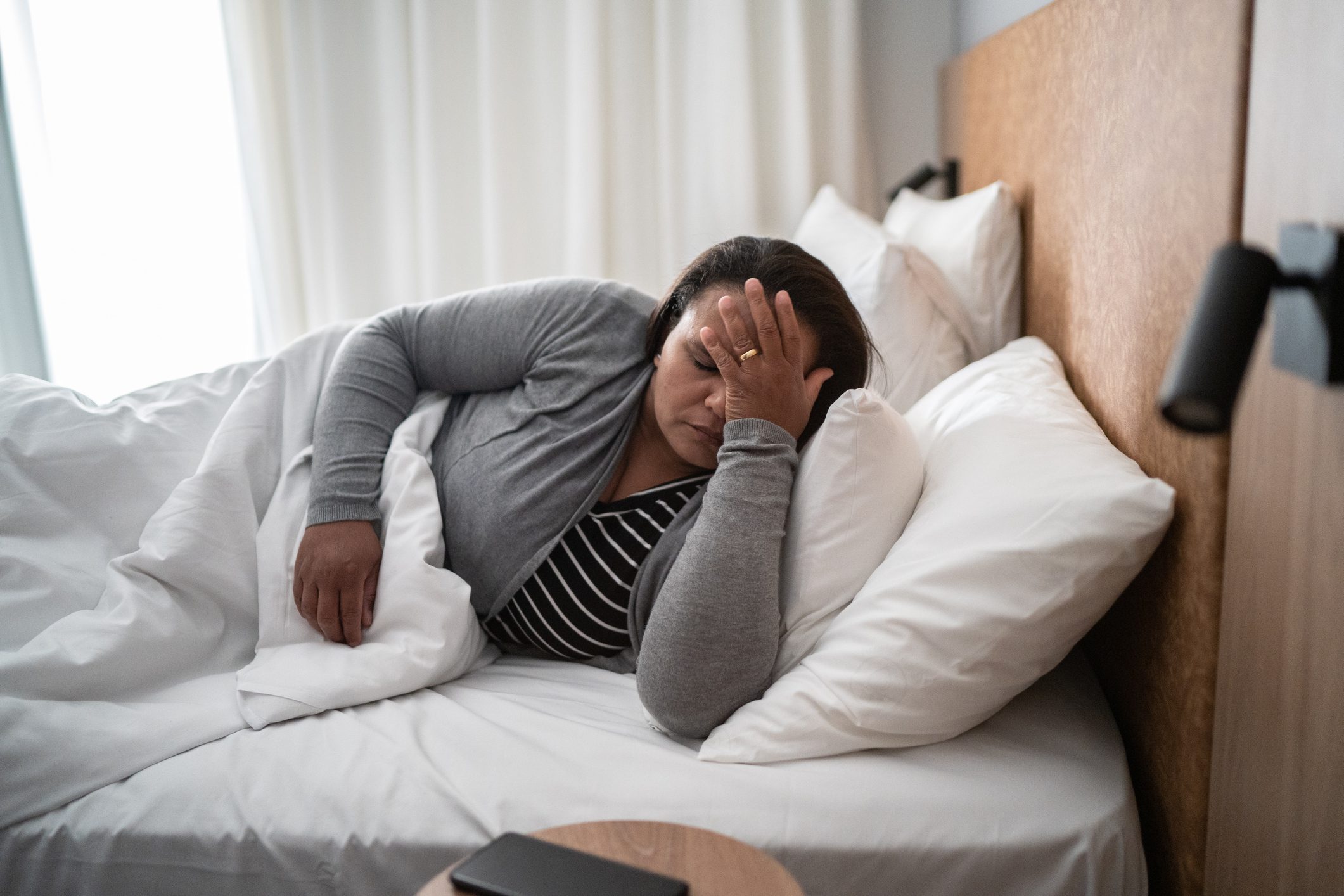A bad night of sleep can be written all over you. Whether it’s bags under your eyes or a sluggish pace the next day, the signs of tossing and turning can be obvious.
But did you know there’s a lot going on beneath the surface of your tired eyes and dragging body? A single poor night of sleep can impact your mood and cognitive function the next day.1
And forget about tons of restless nights. Chronic poor sleep can lead to or exacerbate all kinds of debilitating conditions like cardiovascular disease, type 2 diabetes, mood and cognitive disorders, and weight gain.2-6
What’s the culprit behind these health disturbances? Often, you can blame your hormones. Not only can their fluctuations make it tougher for you to get quality rest, but once you’re getting poor sleep, your hormone function can further deteriorate.
It’s a vicious cycle, but there are ways to combat it. A greater understanding of the effect your hormones can have on your body can help you know the best ways to balance your hormones and get the sleep your body and mind deserve.
Sleep and Your Hunger Hormones
Hunger and sleep are incredibly intertwined, by way of a few different hormones.
First up, there are ghrelin and leptin. They’re the hunger hormones that hardwire you to efficiently fuel your body. Ghrelin lets you know when your body needs some energy (aka calories and food), and leptin is supposed to let you know when you’ve had enough to keep kicking until your next meal.
But poor sleep can throw both ghrelin and leptin all out of whack. Just one night with bad rest and your ghrelin levels can rise, meaning you’re going to feel hungrier than you should the next day.7
At the same time, your body relies on consistent, quality sleep to control your leptin levels. Without your zzzs, leptin can decrease.8
It’s a devastating double whammy—your hunger hormone is telling you that you need to eat, and your fullness cues aren’t showing up to tell you that you’ve had enough. Say hello to cravings, getting “hangry,” and feeling totally unsatisfied after every meal.
Insulin is another hormone affected by sleep that is tied to your hunger and weight. Poor sleep can make you more prone to insulin resistance, a condition that occurs when your body doesn’t properly respond to insulin.9 The resistance makes it more difficult for your body to maintain healthy blood-sugar levels and manage your weight—and can even lead to prediabetes and type 2 diabetes.
Sleep and Your Stress Hormones
Talk about another vicious cycle! I know firsthand how stress can negatively affect your sleep. But if you can’t figure out a way to get quality rest, your stress levels are only going to rise.
Your body needs sleep to regulate your stress hormone, cortisol. Cortisol and sleep are tightly linked. Your body’s production of it decreases at night to allow melatonin to take over, helping relax your body and brain enough to sleep. It ramps up again in the morning, helping you feel ready to take on your day.
But disruptive sleep can mess with your cortisol production.10 You may produce too much of it, leading to feeling stressed and worked up. If it gets too high, you might even feel your heart racing or feel that your mind is on overdrive, preventing you from getting the rest you need to regulate yourself.
Plus, what do you turn to when you’re stressed? Food. Smart diet decisions go out the window when you’re feeling anxious. Eating at night disrupts your hunger hormones even more, making it even more difficult to get back to a healthy eating and sleeping schedule.
Sleep and Your Mood & Energy Hormones
Whether you’re cranky or dragging—or both—after a bad night of sleep, hormonal fluctuations are at work.
We already talked about cortisol. Along with impacting your stress levels, an imbalance of it can make you feel fuzzy or foggy.
Serotonin and dopamine are also impacted by or can exacerbate poor sleep to change your mood. When a lack of rest throws off your hormonal production, these “feel-good” neurotransmitters get out of balance, which can lead to you feeling moody or unable to focus.
Serotonin can also play a role in helping you feel satisfied and full, so if it’s imbalanced, you’re going to find yourself once again reaching for food that your body doesn’t need.
You also might find yourself lacking energy when you’re feeling sleep deprived. That can be because your lack of sleep affected your thyroid’s ability to operate at its peak ability,11 which can make you feel fatigued and lethargic throughout your day.
There are tons of reasons you’re not getting the sleep you need—and I have one solution. No matter what’s keeping you wide awake, my Sleep Candy™ is designed to help you relax at night so you can be refreshed for the next day. Non-habit forming and without any next-day drowsiness, it could be the missing link between you and your sweet dreams.*
Controlling Hormones With Better Sleep
Now that you see how important it is to manage your sleep to keep your hormones in tip-top shape, I’m going to share some of my favorite ways to get a great night’s rest:
Take Charge of Your Stress
Yes, it’s easier said than done. But that doesn’t mean you can’t try! Finding the stress-busting method that works for you will help you get the rest you need to balance your hormones.
It took six months of consistent practice, but I learned that meditation helps relieve my stress immensely. I find that a lot of people do know what helps relieve theirs, they just don’t prioritize it because other things get in the way.
So take this as your personal reminder—starting today, prioritize doing one thing that helps you relax.
If you’re screaming at your screen saying, “I can’t do it, JJ! I can’t decrease my stress!” I’m going to offer you a little help. Take Ten Stress Support is a calming supplement that helps you combat restlessness and irritability. I know life throws a lot at you. With this, you’ll be better equipped to handle it all.*
Pay Attention to Your Sleep Environment
Falling asleep should feel easy, comfortable, and relaxing. So make sure you set up an environment optimized for peace!
Treat yourself to pajamas, bedding, or a sleep mask that you’re excited to wear. Keep your room between 60° and 67° Fahrenheit—researchers have found that temperature is one of the biggest factors contributing to sleep.12 I recommend keeping your bedroom free of blue lights, and I personally love using red lights to help transition my body into sleep mode.
Follow Your Circadian Rhythm
When you eat is as important as what you eat. Researchers have found that when you mess with your circadian rhythm—working late shifts or having a midnight snack, for instance—the harder it will be to control your hunger hormones and lose unwanted weight.13
Measures like keeping your meals to daylight hours, closing up the kitchen about three hours before bed, and maintaining a regular sleep schedule can help you keep your circadian rhythm humming as it should.
Better Sleep = Better Health
I’m not the first to say it, and I won’t be the last—when you make quality rest a priority, your health is going to improve.
By taking steps to get better sleep, you’re going to give your body the time it needs to recharge, produce and regulate your hormone production. Suddenly, it will be a whole lot easier for you to have the balance you need to eliminate cravings, lose unwanted weight, and wake up ready to tackle your day.
When you know how important sleep is, desperately want it, but still can’t easily drift off each night, look for help from my Magnesium Body Calm. Far easier to digest than mass-market versions, this not only helps to calm your body and brain for optimal sleep, but supports your heart and bone health as you snooze. That’s what I call a win-win you deserve today.*
*These statements have not been evaluated by the Food & Drug Administration. Products mentioned are not intended to diagnose, treat, cure, or prevent any disease. The views in this blog by JJ Virgin should never be used as a substitute for professional medical advice. Please work with a healthcare practitioner concerning any medical problem or concern.
Sources:
- Lee S. (2022). Naturally Occurring Consecutive Sleep Loss and Day-to-Day Trajectories of Affective and Physical Well-Being. Annals of behavioral medicine : a publication of the Society of Behavioral Medicine, 56(4), 393–404. https://doi.org/10.1093/abm/kaab055
- Cappuccio, F. P., Cooper, D., D’Elia, L., Strazzullo, P., & Miller, M. A. (2011). Sleep duration predicts cardiovascular outcomes: a systematic review and meta-analysis of prospective studies. European heart journal, 32(12), 1484–1492. https://doi.org/10.1093/eurheartj/ehr007
- Cappuccio, F. P., D’Elia, L., Strazzullo, P., & Miller, M. A. (2010). Quantity and quality of sleep and incidence of type 2 diabetes: a systematic review and meta-analysis. Diabetes care, 33(2), 414–420. https://doi.org/10.2337/dc09-1124
- Alvaro, P. K., Roberts, R. M., & Harris, J. K. (2013). A Systematic Review Assessing Bidirectionality between Sleep Disturbances, Anxiety, and Depression. Sleep, 36(7), 1059–1068. https://doi.org/10.5665/sleep.2810
- Bubu, O. M., Brannick, M., Mortimer, J., Umasabor-Bubu, O., Sebastião, Y. V., Wen, Y., Schwartz, S., Borenstein, A. R., Wu, Y., Morgan, D., & Anderson, W. M. (2017). Sleep, Cognitive impairment, and Alzheimer’s disease: A Systematic Review and Meta-Analysis. Sleep, 40(1), 10.1093/sleep/zsw032. https://doi.org/10.1093/sleep/zsw032
- Patel, S. R., Malhotra, A., White, D. P., Gottlieb, D. J., & Hu, F. B. (2006). Association between reduced sleep and weight gain in women. American journal of epidemiology, 164(10), 947–954. https://doi.org/10.1093/aje/kwj280
- Schmid, S. M., Hallschmid, M., Jauch-Chara, K., Born, J., & Schultes, B. (2008). A single night of sleep deprivation increases ghrelin levels and feelings of hunger in normal-weight healthy men. Journal of sleep research, 17(3), 331–334. https://doi.org/10.1111/j.1365-2869.2008.00662.x
- Spiegel, K., Leproult, R., L’hermite-Balériaux, M., Copinschi, G., Penev, P. D., & Van Cauter, E. (2004). Leptin levels are dependent on sleep duration: relationships with sympathovagal balance, carbohydrate regulation, cortisol, and thyrotropin. The Journal of clinical endocrinology and metabolism, 89(11), 5762–5771. https://doi.org/10.1210/jc.2004-1003
- Antza, C., Kostopoulos, G., Mostafa, S., Nirantharakumar, K., & Tahrani, A. (2021). The links between sleep duration, obesity and type 2 diabetes mellitus. The Journal of endocrinology, 252(2), 125–141. https://doi.org/10.1530/JOE-21-0155
- Nicolaides, N. C., Vgontzas, A. N., Kritikou, I., & Chrousos, G. (2020). HPA Axis and Sleep. In K. R. Feingold (Eds.) et. al., Endotext. MDText.com, Inc.
- Nazem, M. R., Bastanhagh, E., Emami, A., Hedayati, M., Samimi, S., & Karami, M. (2021). The relationship between thyroid function tests and sleep quality: cross-sectional study. Sleep science (Sao Paulo, Brazil), 14(3), 196–200. https://doi.org/10.5935/1984-0063.20200050
- Okamoto-Mizuno, K., & Mizuno, K. (2012). Effects of thermal environment on sleep and circadian rhythm. Journal of physiological anthropology, 31(1), 14. https://doi.org/10.1186/1880-6805-31-14
- Engin A. (2017). Circadian Rhythms in Diet-Induced Obesity. Advances in experimental medicine and biology, 960, 19–52. https://doi.org/10.1007/978-3-319-48382-5_2






